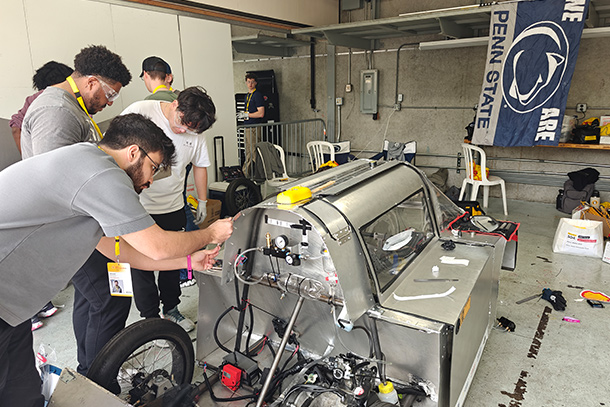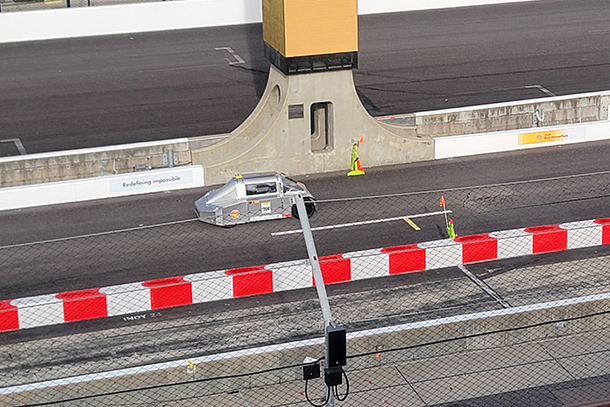
The Shell Eco-Marathon challenges students from around the world to construct a vehicle with the highest possible fuel efficiency rating. Credit: Provided by Alexandria Rhoads/Penn State.
Student team sets school record, places third at Shell Eco-Marathon
The team’s vehicle operates with a fuel efficiency rating 10 times that of traditional cars
Apr 28, 2025
By Ty Tkacik
UNIVERSITY PARK, Pa. — Penn State’s Shell Eco-Marathon team recently placed third at the annual Shell Eco-Marathon, an international competition that challenges teams to design and build a vehicle with the highest possible fuel efficiency. The team — consisting mostly of mechanical engineering majors who participate in the competition as their senior capstone projects — raced against seven other teams in their category on April 2-6 at the Indianapolis Motor Speedway in Indianapolis. Their vehicle achieved a fuel efficiency rate of just over 400 miles per gallon.
Since 1939, the Shell Eco-Marathon has connected thousands of engineering students from around the world to innovate eco-friendly vehicles and showcase sustainable engineering. Teams compete in two major vehicle design categories, prototype and urban concept, and three energy categories: battery-electric, hydrogen fuel cell and internal combustion engine. Penn State’s team placed third in the urban concept, internal combustion engine category, with their vehicle setting a school record of 400.31 miles per gallon.
According to Gary Neal, assistant teaching professor of mechanical engineering, director of mechanical engineering capstone design projects and adviser of the Eco-Marathon capstone project, the challenge of the urban concept category goes beyond just building a fuel-efficient vehicle.
“The vehicle has to have the safety features and amenities you would find in a standard car, including windshield wipers, a horn and lights, while simultaneously operating at a fuel efficiency 10 times that of traditional vehicles on the road,” Neal said. “Designing a vehicle that checks all of those boxes is very difficult. The team’s success and record is indicative of their hard work, grit and determination.”
Penn State’s Eco-Marathon club is open for all students to join, but engineering students have the additional opportunity to take the Eco-Marathon as their senior capstone project through the Penn State Learning Factory. Neal said he believes the professional and technical experience it provides students makes the program unique at Penn State.
“Although the club is geared towards engineering students, students from any field of study are welcome to join and gain hands-on design, construction, prototyping and problem-solving experience,” Neal said. “Aside from the technical experience, students also learn how to collaborate in a large team and learn the importance of effective documentation, communication and planning.”
Alexandria Rhoads, a third-year aerospace engineering undergraduate student and president of Penn State’s Eco-Marathon club, reflected on the work the team had put into their vehicle since the beginning of the fall semester.
“With the exception of the bottom frame of the vehicle, which was constructed late last spring, our team worked extremely hard to build the rest of the vehicle all within this academic year,” Rhoads said. “We essentially had four months to fully design, build and test a new vehicle.”

The team put their vehicle to the test on the Indianapolis Motor Speedway, the same track where the legendary Indianapolis 500 race takes place. Credit: Provided by Alexandria Rhoads/Penn State.
The time constraint was the most significant challenge the team faced while building the car, Rhoads said. Establishing an overall timeline during planning and prototyping was just as important as the actual construction process, as the team needed to have a clear picture of how long each step in the manufacturing process would take.
To adhere to the timeline, team members had to focus on what was absolutely necessary to get the car working rather than what would make the car perfect. Rhoads said that although the team had to make compromises on the vehicle’s features to cut down on manufacturing time, the compromises did not take away from the final design.
“Because the team was filled with hard-working, dedicated people who really wanted to make the best product, we overcame the challenge of this really tight schedule,” Rhoads said. “In the end, we were able to troubleshoot problems before the competition and enter the best vehicle our team has ever had in this year’s competition.”
Despite the compromises and difficulties associated with the timeline, Rhoads is very happy with the team's performance at the Eco-Marathon.
“Overall, I am ecstatic about the way that the competition turned out,” Rhoads said. “Placing third and setting a new school record has been an incredible way to end a year filled with so much hard work and dedication from team members.”
The team is already looking forward to next year’s Eco-Marathon. They said they plan to not only maintain the vehicle they developed for this competition but also begin planning out a new vehicle design. The club is seeking new members for next fall, Rhoads said.
“I encourage anyone interested to check out a club meeting and see if they enjoy what we do,” Rhoads said. “We are always happy to see new faces, and our club is a great place where you can come in with zero knowledge and still participate in some incredible engineering.”
Students interested in joining the team can contact Gary Neal or visit the team website for more information.

